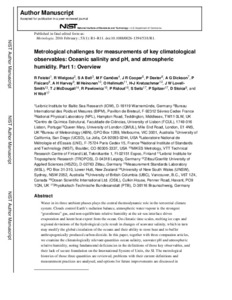Metrological challenges for measurements of key climatological observables: Oceanic salinity and pH, and atmospheric humidity. Part 1: Overview.

View/
Average rating
votes
Date
2016Author
Feistel, R.
Wielgosz, R.
Bell, S.A.
Camões, M. F.
Cooper, J. R.
Dexter, P.
Dickson, A. G.
Fisicaro, P.
Harvey, A. H.
Heinonen, M.
Hellmuth, O.
Kretzschmar, H. J.
Lovell-Smith, J. W.
McDougall, T. J.
Pawlowicz, R.
Ridout, P.,
Seitz, S.
Spitzer, P.
Stoica, D.
Wolf, H.
Metadata
Show full item recordAbstract
Water in its three ambient phases plays the central thermodynamic role in the terrestrial climate
system. Clouds control Earth’s radiation balance, atmospheric water vapour is the strongest
“greenhouse” gas, and non-equilibrium relative humidity at the air-sea interface drives
evaporation and latent heat export from the ocean. On climatic time scales, melting ice caps and
regional deviations of the hydrological cycle result in changes of seawater salinity, which in turn
may modify the global circulation of the oceans and their ability to store heat and to buffer
anthropogenically produced carbon dioxide. In this paper, together with three companion articles,
we examine the climatologically relevant quantities ocean salinity, seawater pH and atmospheric
relative humidity, noting fundamental deficiencies in the definitions of those key observables, and
their lack of secure foundation on the International System of Units, the SI. The metrological
histories of those three quantit.....
Journal
MetrologiaVolume
53Issue
1Page Range
pp R1-R11.Document Language
enSustainable Development Goals (SDG)
14.AEssential Ocean Variables (EOV)
Sea surface salinityBest Practice Type
Standard Operating ProcedureGuide
DOI Original
10.1088/0026-1394/53/1/R1Citation
Feistel, R., Wielgosz, R., Bell, S. A., Camões, M. F., Cooper, J. R., Dexter, P., Dickson, A. G., Fisicaro, P., Harvey, A. H., Heinonen, M., Hellmuth, O., Kretzschmar, H. J., Lovell-Smith, J. W., McDougall, T. J., Pawlowicz, R., Ridout, P., Seitz, S., Spitzer, P., Stoica, D. and Wolf, H. (2015) Metrological challenges for measurements of key climatological observables: Oceanic salinity and pH, and atmospheric humidity. Part 1: Overview. Metrologia, 53(1),pp. R1-R11. DOI:10.1088/0026-1394/53/1/R1Collections
 Repository of community practices in Ocean Research, Applications and Data/Information Management
Repository of community practices in Ocean Research, Applications and Data/Information Management